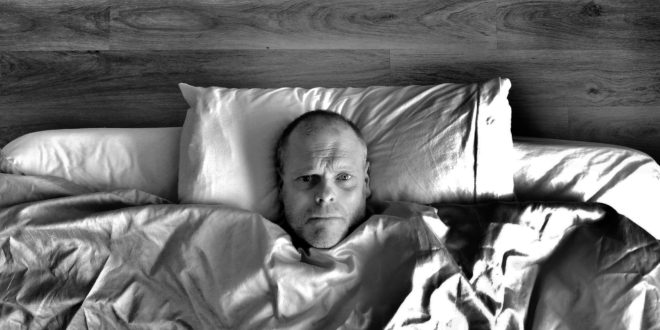People who have received CBT to treat their insomnia can benefit from the treatment for at least a decade – this we can claim, with some confidence, based on our new study. Considering our participants had been suffering from poor sleep for more than ten years when the treatment started, and the input was a mere six weeks of treatment, that must be considered quite good dividend! This very long-term follow-up strengthens the evidence for CBT as the firsthand choice for treatment of insomnia.
If you suffer from Insomnia disorder you are unable to fall asleep when you go to bed, or you are unable to sleep through the night, or you wake up earlier than you would like. As an effect, there are day-time consequences – for instance you are fatigued or unable to perform as desired. Insomnia is very common and comes with both individual suffering and great costs to society not least due to loss of productivity. The good news is that CBT is effective to treat insomnia. CBT gives roughly the same effects as sleep medications in the short term, but still CBT is considered first choice to treat insomnia compared to sleep medications. There are several reasons for this, most of them relating to problems with sleep medications. For instance, sleep medications may cause dependency, may interact with other medications and – perhaps most importantly – the effects of sleep medications are not lasting; they stop working as soon as you stop taking them. (Actually, some may stop working even as you continue taking them.)
CBT on the other hand has been shown to have relatively lasting effects. Many studies on CBT have followed participants for a few months, and most find lasting effects in that timeframe. We have performed a few studies earlier looking at the effects of CBT for insomnia up until 4 years after the end of treatment, and found that many of the positive effects of CBT are indeed still there. This is obviously great, and it made us wonder how long positive effects of CBT can last – could treatment gains be present even longer, say ten years after treatment?
This was exactly what we investigated in this study. To describe what we did, we need to go back in time – about ten years. At this time, we were beginning to realize that given the number of people suffering from insomnia, we needed to find different ways to deliver CBT for insomnia; not everyone can see a therapist face-to-face since there will never be enough CBT-therapists. We therefore performed a study where we investigated if CBT for insomnia, delivered in the form of a self-help book would be able to help people with their insomnia. Our participants had had insomnia for over ten years on average when they entered the study. The treatment was six weeks long, and the participants were divided into three groups: one group got to just read the book, the second group read the book and received a short telephone call from a therapist once a week, and the third group had to wait before getting the book. Good news again: in the original study we saw that insomnia improved quite substantially with this relatively brief intervention; after treatment most of our participants slept better, and most of them no longer had insomnia disorder. Perhaps not so surprisingly, the group who had received telephone calls from a therapist every week improved the most, but the group who read the book on their own did quite well too. Both these groups improved very well compared to the group who had to wait for treatment. We followed our participants up until three months after the end of treatment and saw that the effects were very similar to what they were directly after treatment, even somewhat better. After that point the group who had waited finally received the treatment.
Since then, many studies have been performed investigating if CBT can be delivered in different ways, and we know now that it can indeed. CBT for different problems including insomnia gives good effects whether it is delivered as face-to-face individual treatment, as group treatment, or as self-help delivered over the internet or via books.
Back to the current study. One year after our participants in the original study finished their treatment, we contacted them and asked how they were doing. It turned out that a year after treatment, all participants were still much better off than they were before treatment started. Again, the group who had received therapist support was still a bit better off than the group who had read the book on their own – this group was now twice the size, since the participants who had originally waited had also had the opportunity to read the book by this time. The proportion of patients who did not have an insomnia diagnosis one year after treatment was about 2/3 – and remember that all participants had been diagnosed with insomnia when they entered the study. This was obviously interesting and encouraging, but the really interesting question was to be answered nine years later, when we contacted the participants again. It had now been ten years since they finished their treatment. I must admit we were quite delighted to see the results; insomnia severity was at almost exactly the same level as it had been when the treatment was just finished, and the proportion of patients who no longer had insomnia was still about 2/3. It seems our relatively brief treatment – six weeks – given after people had been sleeping poorly for many years, was able to help them sleep better for the next ten years. That equals a lot of reduction in time of suffering.
When you think about it – with insomnia being a risk factor for other medical and psychiatric conditions, it is possible that some of our participants may have been spared from a condition they might otherwise have developed.
Another finding that we thought was very interesting was that the patients who had used sleep medications during the ten years were much more likely to have insomnia at ten-year follow-up. We don’t know what causes this increased risk for sleep medication users, but one interpretation is that sleep medications are not very good for your sleep. It could be that the sleep you get if you revert back to sleep medications is of worse quality than the sleep you get if you use CBT skills. As usual, it seems more questions arise the more you study something. But they are interesting questions, don’t you think?
Read the full paper: Jernelöv, S., Blom, K., Hentati Isacsson, N., Bjurner, P., Rosén, A., Kraepelien, M., … & Kaldo, V. (2022). Very long-term outcome of cognitive behavioral therapy for insomnia: one-and ten-year follow-up of a randomized controlled trial. Cognitive Behaviour Therapy, 1-17. https://doi.org/10.1080/16506073.2021.2009019



Photo by: CJS*64
 Cognitive Behaviour Therapy A peer reviewed, multidisciplinary journal devoted to the application of behavioural and cognitive sciences to clinical psychology and psychotherapy.
Cognitive Behaviour Therapy A peer reviewed, multidisciplinary journal devoted to the application of behavioural and cognitive sciences to clinical psychology and psychotherapy.





Thank you for posting or sharing this article. I was able to gain plenty of information. It is indeed great.